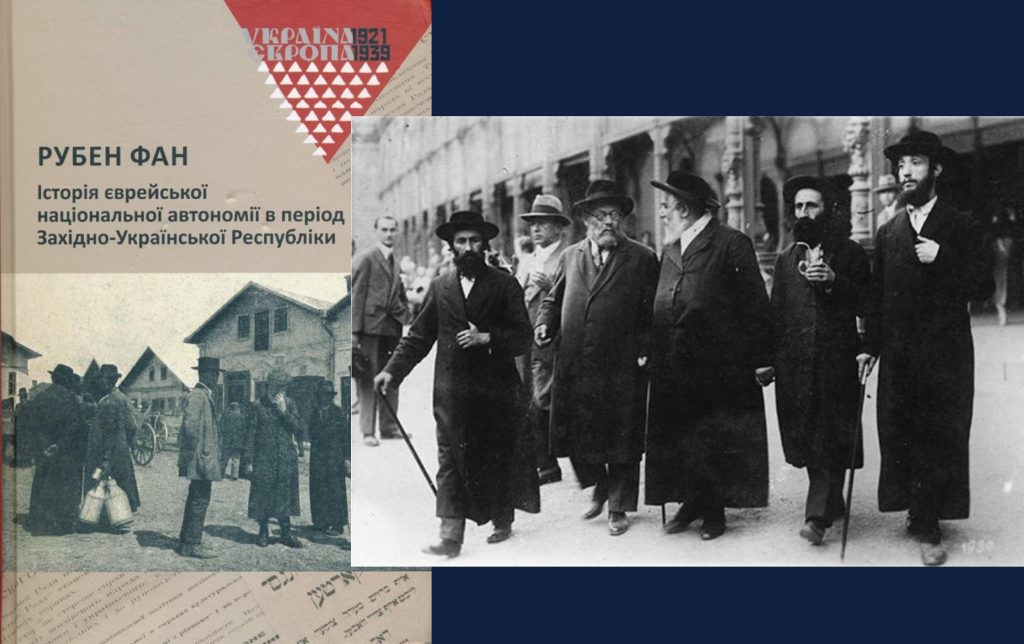"In many cases, Jewish experts held the highest positions in the ZUNR," says Ukrainian historian Oleh Pavlyshyn
Why are we taught about Ukrainian-Jewish relations?
On today's show, the Western Ukrainian National Republic (ZUNR), Ukrainian-Jewish relations during its existence, and Ruben Fahn's book.
Our guest today is the historian Oleh Pavlyshyn, who is associate professor in the Mykhailo Hrushevsky Department of Modern Ukrainian History at Ivan Franko National University of Lviv.
Oleh Pavlyshyn: Ruben Fahn's book The History of Jewish National Autonomy in the Western Ukrainian National Republic is based on reminiscences and documents collected by the author. It was published in Lviv in 1933.
Ruben Fahn was an entrepreneur, writer, researcher of the Galician Karaites and the Vienna Haskalah, as well as a historian and civic and political figure. He was fascinated by history and regularly wrote about the life and activities of Jewish communities. Only experts were familiar with his book, which was little known among the general public. The author was, in fact, not interested in his book being read by the wider public. It was written for his own people. It contains many documented facts. The year 1933 was a time of executions by shooting and antisemitic moods in Europe; a terrible time.
The book was written in order to showcase a Jewish community during this difficult period. Portraying Jewish consolidation during the existence of the ZUNR and cooperation with the Ukrainian government, it is an expression of sympathy for the Ukrainian government and movement. The author also discusses the negative aspects of this period.
Positive collaboration resided in the fact that the Ukrainian National Council granted Jews the right of a nation. This was one of the first decisions announced in Central and Eastern Europe. In many towns, Jews were among the most populous communities. Even in Lviv, they had the second-largest population, after the Poles. Although they did not lay claim to statehood, they desired recognition of their national rights. Thus, Jews proclaimed their neutrality with regard to a possible Ukrainian-Polish political or military conflict.
Can you describe the political life of the Jewish community under the ZUNR?
Oleh Pavlyshyn: Various Jewish political parties existed. They were oriented toward the creation of a Polish state and prepared for this. They enjoyed international support. They had declared their position and sought to renew their political life, which was gradually taking on a more organized form. A Jewish (zhydivska) county council was established in every county town. A historian and civic figure, Ruben Fahn was the secretary of the East Galician Jewish Council. Thus, his book is written not only from the point of view of an observer but also that of a participant in the events of the time. He was able to preserve many documents. His book, The History of Jewish National Autonomy in the Western Ukrainian National Republic is thus called a "book-document."
In the Ukrainian language, the term "Jew" was "zhyd" rather than "ievrei." All the Ukrainian-language documentation produced by the Jewish National Council of Eastern Galicia used this term, which did not carry a negative connotation. It was simply the word for identifying a national identity.
Relations among communities
Oleh Pavlyshyn: The main communities of Western Ukraine during that period were the Ukrainians, Poles, and Jews. When the Ukrainian authorities gained control of Eastern Galicia, they had to establish relations with local Poles and Jews. Poles were now citizens of the ZUNR and were issued instructions on cooperating with the Ukrainian authorities.
The singularity of Ukrainian-Jewish cooperation and relations resides in the fact that, while the Poles refused, by and large, to work in Ukrainian institutions, and there were insufficient numbers of the Ukrainian intelligentsia, the Jews agreed to help them.
All those who obtained employment in the state sector signed an oath of loyalty to the government. Polish officials refused to sign this oath. Jews did not. Thus, they swelled the ranks of ZUNR officials. In many cases, it was Jewish experts who occupied the highest positions. For example, there were two municipal commissars in the towns of Brody and Zolochiv, and both were Jews. It was a question of professionalism, understanding the situation, and trust. Stability and the protection of the population's interests were thus ensured. This cooperation was very positive.
Jewish businessmen played an important role in the oil trade. Galicia ranked third in the world as an oil producer. Unlike the Bolsheviks, the Ukrainian authorities did not nationalize this industry and allowed private businesses to work in this sector.
Jewish traders acted as intermediaries, selling and bartering oil. This is another positive story in the history of Ukrainian-Jewish cooperation.
Another important achievement is the creation of the so-called "Jewish kurin [battalion]," which was part of the Ukrainian Galician Army and took part in combat operations in Dnipro Ukraine. It was a volunteer unit. Jews were ready to defend the Ukrainian land. News of this decision reverberated around the world. Of course, there were some negative moments, for example, antisemitic moods. They did exist; harmony was not present everywhere. It cannot be said that the situation at the time was ideal.
Why are we taught about Ukrainian-Jewish relations?
Oleh Pavlyshyn: All these stories, including this book, speak to the need to create a positive historical experience of cooperation in state building and the political and economic spheres of life. We must cherish historical memory. The fact that the ZUNR reacted energetically to incidents of antisemitism attests to the positive features of Ukrainian-Jewish cooperation. This is crucial for the further development of our self-identity and statehood.
A Jewish figure once declared:
"Unlike Poles, Ukrainians will never seek to assimilate Jews. They treat us with respect."
The importance of these words cannot be overstated.
This program is created with the support of Ukrainian Jewish Encounter (UJE), a Canadian charitable non-profit organization.
Originally appeared in Ukrainian (Hromadske Radio podcast) here.
Translated from the Ukrainian by Marta D. Olynyk.




















